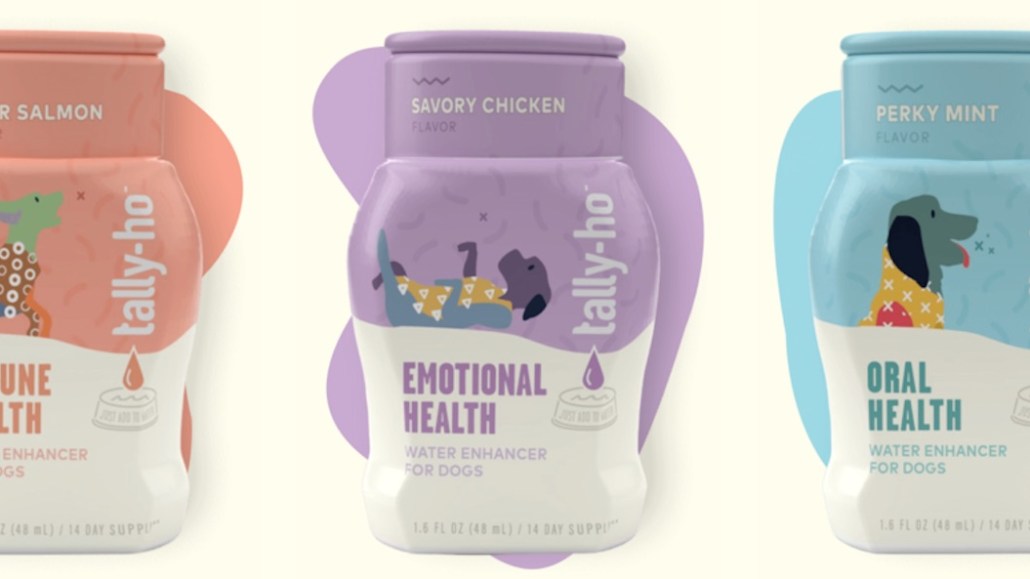Secure your place at the Digiday Media Buying Summit in Nashville, March 2-4
‘We have to be open to failure’: Why Ocean Spray launched a brand incubator for the DTC era

Ocean Spray is looking to branch out beyond cranberries with its Lighthouse Innovation Incubator, broadening its portfolio to include brands in the health and wellness space.
The cooperative joins the ranks of brand holding companies like Procter & Gamble and Anheuser-Busch that have added incubators or venture arms to create new brands to compete with direct-to-consumer startups.
Last week, Ocean Spray debuted the incubator’s latest effort, Tally-Ho, a line of functional water enhancers for dogs available in some Boston-area stores (Ocean Spray has its headquarters in nearby Plymouth, Mass.) as well as Indiegogo, according to the brand’s website. The Lighthouse Innovation Incubator, which Ocean Spray introduced last October with the goal of producing and testing out potential new brands, currently has four new test brands on the market.
The incubator has rolled out a line of herbal tonics, Atoka; a CBD sparkling water line, CarryOn; an edible gummy supplement to help protect skin from the sun, Dabbly; and now Tally-Ho. From concept to market test takes roughly five months, according to Santi Proano, head of the Lighthouse Innovation Incubator, who said that the cooperative doesn’t expect all of these brands to be winners, but that it’s looking to see which could be viable long-term brands to help Ocean Spray grow.
“This group is an internal way to build innovation for new brands that aren’t Ocean Spray to reach new consumers in new categories,” she said “It’s really about stretching beyond what Ocean Spray can do as a brand and the sorts of consumers and categories it can reach.”
Ocean Spray isn’t the only legacy brand looking to build out new brands within its walls. Big brand holding companies have created venture arms like Anheuser-Busch’s ZX Ventures, Siemen’s Next47 and Procter & Gamble’s P&G Ventures.
“Most of the big traditional brands in the consumer space are built for the times when big was beautiful and when agility had not yet entered the lexicon of business,” wrote Dipanjan Chatterjee, vp and principal analyst at Forrester, in an email. “All of that has changed, especially with the all-pervasive infusion of digital. Rather than make a lumbering pivot to agility, incubation is a low-cost, low-risk way to play fast and loose to see if something sticks.”
That’s exactly what Ocean Spray is doing with the incubator which has just five employees dedicated full-time to it. With each new brand idea, the incubator is running market tests, analyzing the success of those tests and then deciding whether or not to proceed with the brand. Should the test prove successful, the brand will be given the resources to grow by Ocean Spray and be a priority. Otherwise, the brand will either be deprioritized or killed off completely.
“We really embrace the idea that if we’re going to test we have to be open to failure,” said Proano. “A lot of innovation fails. [We’re trying to do it] quickly and cheaply so that we can learn something from it, iterate and move forward with either killing a project or making it bigger.”
Creating brands outside of the Ocean Spray banner to grow makes sense to Allen Adamson, brand analyst and co-founder of the brand consultancy Metaforce, But, he noted, there are challenges. “Ocean Spray is so iconic, so big and so linked to cranberries that no matter how much innovation they’ve done it just feels like the same old Ocean Spray,” said Adamson. “To some extent, if they are going to grow new brands they have to get away from the Ocean Spray brand and system.”
That said, Ocean Spray isn’t solely leaning on the incubator for innovation as the cooperative has other groups working to modernize the Ocean Spray brand and find new ways to expand it. Still, the cooperative recognizes that to venture into new and emerging categories like pet wellness or CBD it will need new brands that can speak to those consumers.
“There’s a deep recognition of the need for transformation,” said Proano. “We do really, really well within our existing categories but we really want to make sure we assure the future.”
More in Marketing

Future of Marketing Briefing: AI’s branding problem is why marketers keep it off the label
The reputational downside is clearer than the branding upside, which makes discretion the safer strategy.

While holdcos build ‘death stars of content,’ indie creative agencies take alternative routes
Indie agencies and the holding company sector were once bound together. The Super Bowl and WPP’s latest remodeling plans show they’re heading in different directions.

How Boll & Branch leverages AI for operational and creative tasks
Boll & Branch first and foremost uses AI to manage workflows across teams.







